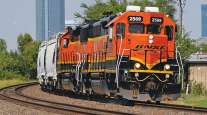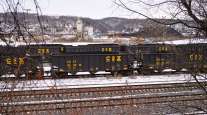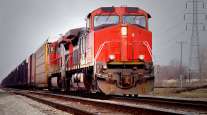Senior Reporter
Ohio Derailment Prompts Congressional Panels’ Review of Freight Rail

[Stay on top of transportation news: Get TTNews in your inbox.]
Transportation committees on Capitol Hill are planning in-depth examinations of the circumstances surrounding the derailment this month of a freight train in Ohio.
With the rail industry contributing a key role to the country’s supply chain, a look at freight connectivity will be among policymakers’ focus during a series of upcoming hearings in the Senate and House.
Policy hearings will emphasize environmental and regulatory matters, while the connectivity of the commercial transportation sector also will be a priority for lawmakers, senior aides told Transport Topics.
After a brief recess, members of Congress resume their legislative schedule during the week of Feb. 27.
The Norfolk Southern train derailment in East Palestine, OH has led to serious health and safety concerns from the surrounding communities. Given these concerns, I will hold an @EPWCmte hearing soon with @SenCapito on the environmental and public health impacts of this incident. — Senator Tom Carper (@SenatorCarper) February 18, 2023
“The recent Norfolk Southern train derailment in East Palestine, Ohio, has led to serious health and safety concerns from the surrounding communities. Given these concerns, we will hold a committee hearing soon on the environmental and public health impacts of this incident,” Sens. Tom Carper (D-Del.) and Shelley Moore Capito (R-W.Va.), chairman and ranking member, respectively, of the Environment and Public Works Committee on highways, said Feb. 17.
“Our focus will be to examine the local, state and federal response in the immediate aftermath of the train derailment and the ongoing efforts to clean up toxic chemicals in the surrounding environment. We believe this is an important step to ensure that response prioritizes the health and safety of those impacted by this terrible accident,” the EPW leaders added.
Commerce Committee Chairwoman Maria Cantwell (D-Wash.), the chamber’s top policymaker on freight affairs, is seeking background from railroad companies about their operations.
“Over the past five years, the Class I railroads have cut their workforce by nearly one third, shuttered rail yards where railcars are traditionally inspected, and are running longer and heavier trains. While some of these changes may be an improvement, they also come with new risks that current federal regulations may not consider,” Cantwell wrote to Alan Shaw, president and CEO of Norfolk Southern, on Feb. 17. “Thousands of trains carrying hazardous materials, like the one that derailed in Ohio, travel through communities throughout the nation each day. Every railroad must re-examine its hazardous materials safety practices to better protect its employees, the environment, and American families and reaffirm safety as a top priority.”
We will now excavate the soil and replace the tracks in response to feedback from the citizens of East Palestine. Work on the first rail line will begin immediately, with the second line to be replaced directly after. https://t.co/cjL6P2OXzD pic.twitter.com/ikjAdm8ON5 — Norfolk Southern (@nscorp) February 23, 2023
On the House side, Republican leaders scheduled briefings for the membership of the transportation committee to gain an understanding of post-derailment efforts and an investigation by the National Transportation Safety Board. Further oversight focused on rail operations are expected.
Democrats on the transportation panel applauded Secretary Pete Buttigieg’s tour of East Palestine on Feb. 23. The trip “will go a long way in ensuring the people of East Palestine and the surrounding communities know their leaders are doing everything possible to make the situation right,” said Transportation and Infrastructure Committee ranking member Rick Larsen (D-Wash.).
Buttigieg recently pressed the freight rail industry to enhance safety and proceed with the deployment of new inspection technologies, proactive advance notification to state emergency response teams, and prioritize paid sick leave for its workforce.
The extraordinary people I met in East Palestine today asked for what anyone would want in this situation – safety, support, and accountability – and not to be used for political gain. We'll keep doing the real work for as long as it takes. pic.twitter.com/cv08RkapHz — Secretary Pete Buttigieg (@SecretaryPete) February 23, 2023
“Profit and expediency must never outweigh the safety of the American people,” Buttigieg said prior to his tour of East Palestine. “We at USDOT are doing everything in our power to improve rail safety, and we insist that the rail industry do the same — while inviting Congress to work with us to raise the bar.”
As part of a remediation plan, Norfolk Southern announced it will excavate the soil and replace tracks in the derailment area. After emergency evacuations were ordered, federal authorities continue to test air and water quality.
“In coordination with Ohio and U.S. Environmental Protection Agencies, we are changing our remediation plan to temporarily remove the tracks so we can excavate the soil,” Shaw said in a statement Feb. 22. “It is important to me that the members of this community have confidence in Norfolk Southern’s remediation efforts and that we are working closely with local, state and federal agencies. An important part of this plan is to listen to the concerns of the community and that’s a primary reason why we are going to enhance our plan.”
Want more news? Listen to today's daily briefing above or go here for more info
In a separate statement on Feb. 22, Chris Jahn, president and CEO of the American Chemistry Council, an industry stakeholder, said: “Experience has shown that advancing safety requires us to apply the lessons learned from accident investigations and rely on scientific data to determine what safety measures will deliver the greatest benefit.”
He continued that his group is “committed to working with our transportation partners along with policymakers and other stakeholders to promote the safety of the products of our industry and help protect the public from future accidents.”




